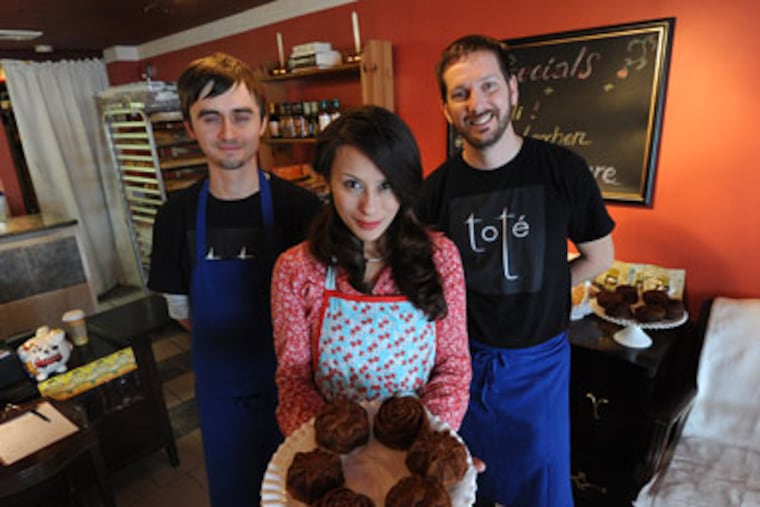
Peter McAndrews, arguably Philadelphia's Sandwich King, is doing something sacrilegious by sandwich standards: At Paesano's, his fantastic Philadelphia shops, he is serving select sandwiches on gluten-free bread.
Seriously. The same bread that is more often compared to hockey pucks than haute cuisine. But McAndrews isn't making concessions. He's using the fresh-baked products from Toté Bakery, a gluten-free bread bakery - a rarity in the region - which opened in the Italian Market a few months ago.
"Gluten-free stuff is always horrible," says McAndrews, whose customers often request the alternative bread because they suffer from celiac disease (like his sons), have sensitivities to gluten, or just choose to remove it from their diet. "These guys are like magicians with the bread. They are doing Philadelphia a great justice."
It's not your imagination - the words gluten-free are omnipresent. As more people become aware of their tumultuous relationship to gluten - a protein found in wheat, barley, and rye - more products are being created to respond to their needs.
Locally, supermarkets are increasingly carrying gluten-free products - taste not guaranteed. We have well-regarded gluten-less pastry shops such as Sweet Freedom Bakery in Center City and the Little Bakery in Blue Bell, to name two. But Toté is tackling what GlutenFreePhilly.com founder Michael Savett calls the "holy grail" of this restricted eating: fresh bread.
Toté owners Eugene Torsunov and Omer Taffet first cooked together at Davio's. The life of a chef often comes with atrocious eating habits, and the bagels and pizza that Torsunov was eating were taking a toll on his health. He was increasingly lethargic, bloated, and foggy. He was diagnosed with celiac disease, cut out gluten, and within two weeks was back to his old self.
A move to the kitchen of Kanella enabled the coworkers to experiment more with breadmaking, a passion for both. "After working in restaurants I knew for a fact that I didn't want to open a restaurant," Taffet said. "I've always loved bread, and with Eugene being gluten-free, we decided to combine the ideas."
Before they even found a space, they needed to find their recipes. They spent time last summer taking field trips to other gluten-free spots, of which there aren't many. They found the best gluten-free breadmakers in our area in Lancaster, at a bakery named Amaranth. "Philadelphia is such a bread city," Taffet said. It confirmed that the niche market was in need of some good dough.
Most of the summer, though, was spent in Taffet's kitchen, developing their base menu. Creating quality goods was a huge challenge. It's not as though they could crack open an old book of gluten-free breadmaking techniques. "It was like a lab," Torsunov said. "The older flours we use perform so differently than wheat."
By "older" they mean antique, not aged. Their flours are made from grains and seeds known from biblical times: teff, millet, quinoa, and amaranth, to name a few.
The secret, they discovered, is to use a combination of these flours to achieve similarity to the stretchy, airy, soft texture and taste of traditional breads. They add moisture, protein (mostly through eggs), and all-natural gums such as xanthan to stabilize the dough.
Taste aside, commercial gluten-free products often rely heavily on white rice, potato, and tapioca flours, which the Toté owners say don't have the health benefits and amino acids that their flours do.
Their ingredients come at a cost. Quinoa flour is more than four times as expensive as regular white flour. It was important that their products didn't seem out of reach; Toté baguettes sell for $3.50. (Baguettes sell at Parc for $3.)
The flours might be old, but the products are modern and baked fresh daily: Besides baguettes, they sell doughy focaccia, sliced sourdough loaves, bagels, and buoyant dinner rolls. Sweets also line the store shelves - soft, nutty chocolate chip cookies, banana nut muffins, and hamantaschen for Purim. They recently added cannoli shells to the menu (BYO filling).
Most start-up restaurants save money by purchasing used equipment, but to ensure there would be no cross-contaminating residue, Taffet and Torsunov had to purchase everything new.
While they've been too busy to do much marketing and make sales calls, restaurants have been sending in requests. They overnight-ship breads to a gourmet market in New York, and a few in the suburbs. The Four Seasons buys slider rolls, Zavino buys pizza shells, and Underdog, a new Center City hot dog shop, asked them to create buns for their wieners.
On weekends, their shop is crowded with customers from as near as the Philly suburbs and as far as Washington, who buy in bulk and freeze the goods. They are working on an online store, and have thoughts of opening a Center City location one day, and pushing wholesale business.
While sales have exceeded their expectations, there is still a stigma attached to gluten-free food, making it hard to cross over into mainstream eating. "Eugene says I have my spiel on autopilot now," Taffet joked. They educate customers about the potential perils of gluten and the products they use, and recount battle stories they hear from customers. (Tennis star Novak Djokovic cut out gluten and starting winning Grand Slam tournaments.)
For parents who have gluten-sensitive kids, Toté has become a weekly destination. Taffet and Torsunov have found that usually, if one child has issues, parents find it easiest to make the whole house gluten-free. That's good for business.
Savett, the GlutenFreePhilly.com publisher and Philadelphia attorney, says his celiac son can finally enjoy sandwiches again. "Making good gluten-free bread is a serious accomplishment," he said. "They've nailed it."